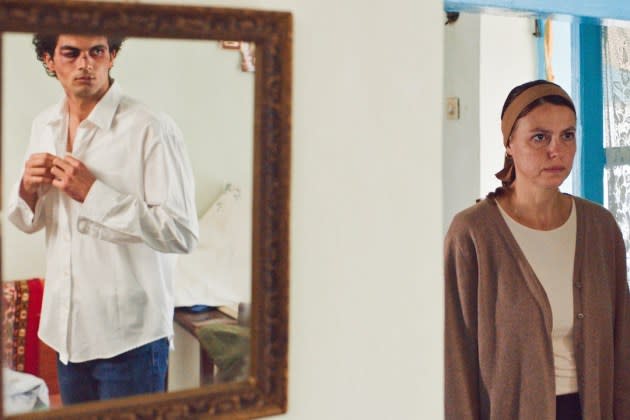‘Three Kilometers to the End of the World’ Review: A Portrait of a Small Romanian Village, Made Smaller Still by Prejudice

A hot, strong summer wind is the overriding soundtrack to “Three Kilometers to the End of the World” — the kind of dry, whirring weather that swallows conversations held even a short distance away, and carries stray, light objects far from where they meant to land. For 17-year-old Adi, however, it’s not loud enough to keep his secrets safe, nor heavy enough to lift and float him away from the home in which he feels increasingly imprisoned. A rural village in thrall to the Romanian Orthodox Church proves as hostile an environment as you’d expect for a closeted gay teen in writer-director Emanuel Pârvu’s claustrophobic study of personal and institutional prejudice closing in on a community misfit: If the breeze would just die down for a second, you might hear Adi’s inner clock tensely counting down his slim shot at freedom.
An accomplished actor now making his third feature behind the camera, Pârvu is well-versed in the formal and thematic hallmarks of Romanian New Wave cinema, having previously been directed by the likes of Cristian Mungiu (“Graduation”), Cãlin Peter Netzer (“Familiar”) and Bogdan George Apetri (“Miracle”). “Three Kilometers to the End of the World” follows faithfully in that national tradition — there’s no mistaking the cinematic heritage of its patient long takes and preference for static, body-slicing camera placement, nor its preoccupation with the corrupt inner workings of local authorities. But for all its cool, compelling proficiency, there’s little about the film that feels idiosyncratic, either stylistically or in its surface-level human portraiture. A Cannes Competition berth will doubtless raise Pârvu’s auteur profile, but feels a touch premature.
More from Variety
The title is never referenced or explained in “Three Kilometers to the End of the World,” though it does evocatively imply a location that isn’t even the middle of nowhere so much as the very limit of it, before some outer realm of oblivion takes over. That’s certainly how Adi (Ciprian Chiujdea) feels about his home village in the Danube Delta — an attractively tangled patchwork of farmland, waterways and massed, swaying reeds, shot by Silviu Stavilă in sunburnt widescreen compositions that don’t entirely mask its more desolate qualities. Bright, sensitive and soulfully handsome, Adi dreams of a liberated adult life in Bucharest, though his unimaginative, God-fearing parents (Bogdan Dumitrache and Laura Vasiliu) see only a marine academy in his future.
We surmise the full extent of Adi’s unrest in an early, charged scene that sees him furtively hooking up with a male tourist at a nightclub, and sharing a moment of tactile intimacy in the hushed darkness outside. Pârvu pointedly doesn’t depict the crucial event that follows: a brutal gay-bashing that leaves Adi mapped with welts and bruises, his face a swollen fright, which is how we, along with his father, find him the next morning. The omission isn’t for the purposes of mystery. The perpetrators, a thuggish pair of local brothers, readily admit to the attack when probed by the cynical, uninvested local police chief (Valeriu Andriuță); their father, to whom Adi’s dad owes a sizable amount of money, is happy to cancel the debt in exchange for dropped charges. “He’s a f—got, what the hell,” he sniffs. “If word gets out, the village will be swarming with them.”
Adi’s parents aren’t so willing to let the matter drop, however, since the news of their son’s sexuality comes as a genuine shock to them. “A beating and a fuck are two things you can’t take back,” his father seethes, clearly more offended by the possibility of the latter. Their pursuit of justice for the assault rings hollow when viewed against their primitive punishment of Adi, which extends to holding him captive in his locked bedroom, binding and gagging him for an exorcism by the village priest (Adrian Titieni). There’s nervy dramatic tension in their naive indecision between combating bigotry and remaining violently complicit therein, while Pârvu and Miruna Berescu’s script deftly involves the perspectives of the increasingly anxious police, who would rather see the victim quietly slip town than become a cause célèbre, the church elders remaining stubbornly righteous in their homophobia, and a visiting child services officer keen to burn it all down.
Somewhat overlooked in this furious face-off between love, hate, tradition and justice is the perspective of Adi himself, presented as a victim several times over, though we get limited access to the inner life behind his weary black-and-blue gaze. The character may be an effective stand-in for legions of queer youths living in fear in conservative rural Romania, but “Three Kilometers to the End of the World” feels more comfortable with emblematic types than messy, conflicted human souls. Adi wants for detail and dimension, but so do his confused parents, victims themselves of entrenched communal prejudice and religious hegemony. There should be a sense of wounding loss in the disintegration — the self-destruction, even — of their small, frail family. As it is, Pârvu’s film leaves us eager as Adi to flee this pretty, hateful backwater, the warm wind pushing us on, with nary a backward glance.
Best of Variety
Sign up for Variety’s Newsletter. For the latest news, follow us on Facebook, Twitter, and Instagram.

 Yahoo Lifestyle
Yahoo Lifestyle 